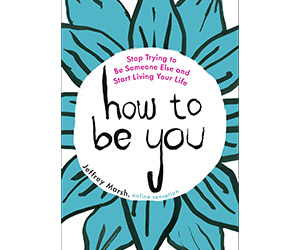How Well Do You Know Yourself?
Most of us grew up being told not to pay much attention to our inner life, and not to notice why we do the things we do. But to be free and happy, says the author of How to Be You, we must figure out the secrets we keep even from ourselves.

Photo: Thomas Barwick/Getty Images
Start now, by answering the following questions in writing:
1. How would your ideal romantic partner, or ideal best friend, treat you? If you had someone who was very emotionally close to you, how would he or she act? What would he or she say to you? What would an ideal day with that person be like?
2. What does sadness feel like in your body? Describe the actual physical feelings that go with being sad. Is the sensation heavy or light? Does it move and jiggle or does it feel more like something is stuck? Where exactly in your body do you feel it? Be descriptive and use as many adjectives as you can to describe how sadness feels, physically. If it seems like it would help, draw a picture of where sadness "lives" in your body. Now, go back and answer these exact same questions about feeling happy.
3. Imagine you are all by yourself and no one else is around. Describe your usual experience. Is it lonely or glorious or something else altogether? Is it frightening? What is it like for you to be alone?
4. Currently, what's your biggest fear? What could happen to you that would be very scary?
5. What is one quality about you that people admire? When people tell you how much they love that trait of yours, how do you react?
RESULTS: Okay, pencils down. Now that you've had a chance to answer the questions, take a few deep breaths. Congratulations! I hope you can feel how enjoyable it is to discover new things about such an interesting person: You. I'd love for you to keep a few things in mind for each question.
1. How would your ideal romantic partner or ideal best friend treat you? If you had someone who was very emotionally close to you, how would he or she act? What would he or she say to you? What would an ideal day with that person be like?
This is a really good indication of how you want everybody to treat you. And who could blame you? If everybody could be as kind and accepting as someone we're in love with, or very close to, the world would be great indeed. The answers also provide a clue as to how you wish you could treat yourself. For now, don't just notice your actual answer. Notice how you came up with the answer. How do you know what a romantic partner, or a best friend, should say? Did you feel that the person gave you something you deserve to have? Is there a sense in your answers that a close relationship like this is impossible for you? Maybe you felt like you had no interest in a close friend or a partner at all. These are interesting things to notice.
2. What does sadness feel like in your body? Describe the actual physical feelings that go with being sad. Is the sensation heavy or light? Does it move and jiggle or does it feel more like something is stuck? Where exactly in your body do you feel it? Be descriptive and use as many adjectives as you can to describe how sadness feels, physically. If it seems like it would help, draw a picture of where sadness "lives" in your body. Now go back and answer these exact same questions about feeling happy.
Exactly where you feel your feelings is one of the most important things you can learn about how you tick. When someone asks you how you are feeling, do you always feel how you're feeling in the same part of your body? Maybe most of your emotions are in your chest or your throat. Your body is a part of what makes you you, and to know how it expresses and feels is a major way to understand yourself. If you are like most people, you tend to spend a lot of time "up in your head," ignoring five sixths of yourself! Also really helpful to see are any judgments creeping into your answers. A big part of observing yourself is learning to do so as neutrally as you can, or with as playful an attitude as possible, like a joyful scientist would. Do your answers indicate that you have a certain opinion about sadness or happiness? Is one feeling better than the other? Did you get, from your answers, an idea of what you think about the feelings of sadness and happiness?
3. Imagine you are all by yourself and no one else is around. Describe your usual experience. Is it lonely or glorious or something else altogether? Is it frightening? What is it like for you to be alone?
Chances are, you were raised on distraction. TV shows blaring all the time, cruising on the Internet, so you didn't have time to look at (let alone learn about) yourself. This question will help you understand how you feel about looking inward. Do you hate it? Does it scare you? Is it something you love that you can't get enough of? There isn't a right or wrong answer here, but how you approach this question, and how you approach the idea of being alone, gives you some clues about how you approach getting to know yourself. Spending time with yourself and learning about yourself are very much related. If alone time is something you hate, is it because you feel judged when you're alone? Or is being by yourself a chance to let go and sink into being true to who you are? Is it, maybe, a torturous, uncomfortable, desperate time? For you, it's probably some version of all of these, but however you feel about being alone is probably the same as how you feel about yourself in general. Consider how you might use some time in solitude to change and deepen your relationship with yourself.
4. Currently, what's your biggest fear? What could happen to you that would be very scary?
In general, fears are your best indication that you are about to learn something big about yourself. If you are deathly afraid to tell someone, "Listen, it's not just that I like you, it's that I like you like you," for instance, there is a big chance that you might learn how much potential rejection you can handle—or how much potential excitement. Fear indicates that your horizons are about to broaden. You might be about to change your perspective on what you think you're capable of doing. Right on that edge of expansion, fear shows up. When it comes to learning about yourself, fear can be an indication of an area you probably want to explore. Of course, yes, there are truly awful things to be afraid of, like being killed or losing a loved one. But even those fears might hold clues to things you think you could never get over that you could come to terms with eventually. Learning about a fear in yourself is not a stopping point; it's an invitation for more "getting to know," for a deeper exploration. What does your fear say about you? Where are your current boundaries? Where might you expand a bit?
5. What is one quality about you that people admire? When people tell you how much they love that trait of yours, how do you react?
How you handle compliments says everything about you. Did your parents set out to teach you to be humble and actually end up teaching you not to have a very high opinion of yourself? Does it feel polite and nice to deflect or downplay a compliment? "Oh, no, it was nothing!" you say, hoping no one will notice that you really are as brilliant and smart and talented as they said. Or maybe you love getting praised. Maybe you say, "Thank you! I've always thought that about myself, too," when people compliment you. However you react, and however you answered this question, there is no right or wrong way to be. To really drive home our theme: You don't want to get into the habit of judging the things you find as you learn more about yourself; you want to practice enjoying the exploration.
It's funny to think that you need an owner's manual, but chances are you grew up being told not to pay much attention to your inner life and not to notice how you function, or even why you do the things you do. You probably got the message that self-examination might do damage or should be scary somehow. None of this is true! Knowing more about how you do what you do and some of the old (perhaps outdated) reasons you have for acting the way you act can be really helpful. It can lead to a lot of freedom in your life. Maybe nobody has ever really asked about your likes and dislikes and what you love before, so it may be hard-going at first. Self-examination may feel awkward, but you are worth the try. Maybe nobody has ever really listened to what you have to say. Maybe nobody has ever really cared to know about your life. Maybe sometimes you feel like no one understands you. Learning more about yourself means being willing to understand yourself. Loving yourself helps you love other people. When you get right down to it, there is little difference between you and other people. We all deserve love because we are all here, in this together.
 Excerpted from How to Be You: Stop Trying to Be Someone Else and Start Living Your Life, by Jeffrey Marsh. Printed with the permission of TarcherPerigee/Penguin, a division of Penguin Random House. Copyright Jeffrey Marsh. ©2016.
Excerpted from How to Be You: Stop Trying to Be Someone Else and Start Living Your Life, by Jeffrey Marsh. Printed with the permission of TarcherPerigee/Penguin, a division of Penguin Random House. Copyright Jeffrey Marsh. ©2016.



